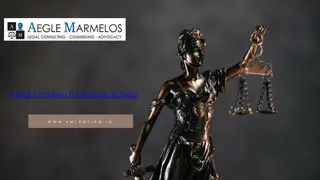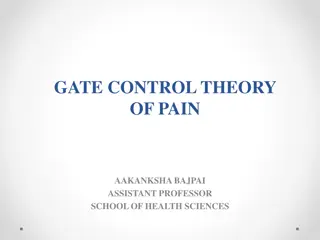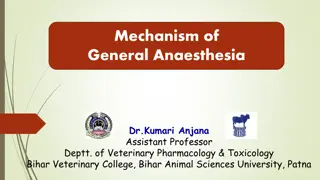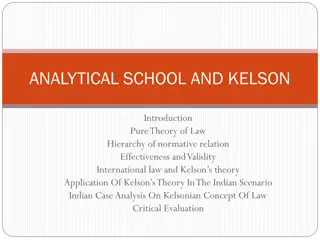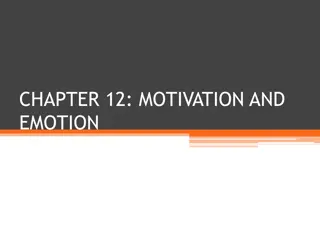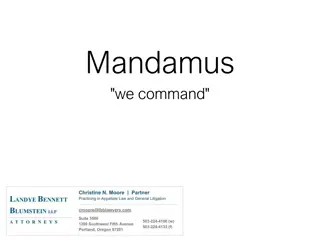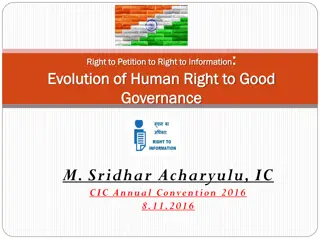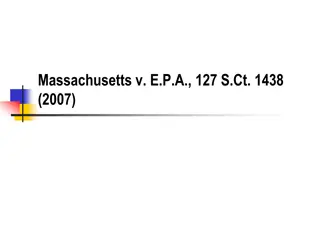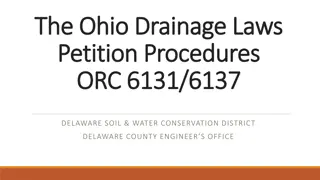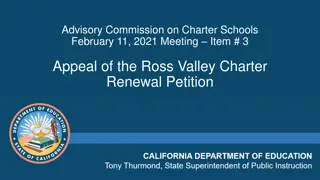Ginzburg Landau phenomenological Theory
The Ginzburg-Landau phenomenological theory explains superconductivity and superfluidity as distinct thermodynamic phases. It focuses on phase transitions characterized by singularities in specific heat at the transition temperature. Derived from BCS theory, it quantifies condensation energy, emphas
1 views • 38 slides
Crystal Field Theory in Transition Metal Complexes
Crystal Field Theory (CFT) explains the colors and magnetic properties of transition metal complexes. It focuses on the energy changes in d-orbitals of metal ions caused by surrounding ligands. This theory, developed in 1929, provides insights into the bonding interactions in complex compounds. The
10 views • 44 slides
Supreme Court Rejects Petitions Against EVM Use In Elections
Supreme Court Rejects Petitions Against EVM Use In Elections\\nNew Delhi: \\nThe Supreme Court on Friday dismissed two writ petitions: namely, apprehensions over 19 lakhs missing EVMs and another petition to use ballot paper to conduct elections while reposing its faith in the EVMs.\\nAdjudicating t
1 views • 4 slides
Understanding Social Learning Theory and the Power of Example
Social Learning Theory, introduced by Bandura, emphasizes learning through observation and modeling. It explores how individuals acquire behavioral dispositions, trial-and-error experiences, and the impact of stimuli in the environment. The theory focuses on the importance of attention, retention, a
1 views • 17 slides
Process for Filing a Petition for Divorce in India
Filing a Petition for Divorce in India\n\nFiling a Petition: The divorce process in India begins with the crucial step of filing a petition. This is the formal action taken by one spouse, known as the petitioner, to initiate the legal proceedings for divorce. The petition is filed in the appropriate
0 views • 4 slides
Evolution of Mathematical Theories and Proof Systems
Development of mathematical theories such as model theory, proof theory, set theory, recursion theory, and computational complexity is discussed, starting from historical perspectives with Dedekind and Peano to Godel's theorems, recursion theory's golden age in the 1930s, and advancements in proof t
1 views • 29 slides
Introduction to Organizational Behavior: Management Theories and Practices
Explore the evolution of organizational behavior from early management theories to contemporary practices. Understand the historical foundations and relevance of management theory in shaping workplace dynamics. Delve into key concepts like Scientific Management, Administrative Management, Bureaucrat
1 views • 28 slides
Theories on the Origin of State: Divine, Force, Patriarchal, and More
Various theories such as Divine Origin, Force Theory, Patriarchal Theory, and others explain the origin of the state. Divine theories attribute state creation to God, while Force Theory emphasizes the strong subjugating the weak to establish authority. Each theory offers unique perspectives on the h
1 views • 24 slides
Understanding Forgetting: Theories and Influence on Memory Recall
Forgetting is a complex phenomenon influenced by theories such as Decay Theory, Interference Theory, and Motivated Forgetting. The Ebbinghaus forgetting curve highlights how memories fade over time. Decay Theory suggests memories decay over time, while Interference Theory explains how old and new me
0 views • 25 slides
Psychological Theories of Criminality: Understanding the Roots
Psychological theories of criminality delve into the association between intelligence, personality, learning, and criminal behavior. Major theories include Psychodynamic Theory by Freud, Behavioral Theory by Bandura, and Cognitive Theory by Kohlberg. These theories explore how unconscious mental pro
1 views • 20 slides
Austin's Theory of Law by Rinkey Sharma: An Overview
Austin's Theory of Law, presented by Rinkey Sharma, delves into the Imperative Theory of Law as proposed by Austin, known as the father of English jurisprudence. It explores General and Particular Jurisprudence, Austin's definition of law, and the elements of positive law, emphasizing the concepts o
0 views • 11 slides
Theories of International Relations Overview
The field of International Relations (IR) encompasses various theories that seek to explain global phenomena, drawing from disciplines like history, philosophy, and economics. Theory, derived from contemplation and speculation, organizes ideas to explain issues such as state emergence, conflict caus
1 views • 47 slides
Understanding the Gate Control Theory of Pain in Pain Management
This detailed content delves into the Gate Control Theory of Pain, explaining pain pathways involving nociceptors, A-delta fibers, and C fibers. It further explores central pain pathways like the spinothalamic tract, spinomesencephalic tract, and spinoreticular tract. The theory's mechanism of pain
3 views • 11 slides
Overview of Cooperative Game Theory and Bargaining Solutions
Cooperative game theory explores situations where players have mutual benefits in cooperating. The focus is on bargaining solutions to reach agreements despite conflicting interests. Key concepts include Nash Bargaining Solution, Kalai-Smorodinsky Bargaining Solution, and Rubinstein Bargaining Proce
1 views • 24 slides
Understanding the Theory of Firms: Neoclassical vs. Modern Approaches
The theory of firms is explored through the Neoclassical and Modern perspectives. Neoclassical theory focuses on profit maximization, while Modern theory delves into managerial, principal-agent, and transaction cost theories. The discussion covers criticisms of Neoclassical theory and the essential
1 views • 79 slides
Mechanism of General Anaesthesia Theories: Lipid Solubility, Surface Tension, Microcrystal, Protein Binding
Mechanism of general anaesthesia involves theories focusing on the interaction of anaesthetics with cell membrane components like lipids and proteins. The Lipid Solubility theory emphasizes the importance of an anaesthetic's affinity and solubility in nerve cell membranes, while the Surface Tension
1 views • 10 slides
Analytical School and Kelson's Pure Theory of Law: A Critical Analysis
Kelsen's Pure Theory of Law emphasizes the hierarchy of norms and the normative character of law, free from extra-legal elements. This theory, in contrast to other perspectives like Hart's, aims to maintain the purity of law by isolating strictly legal components. Kelsen's focus on normative behavio
1 views • 15 slides
Effective Strategy of Using Petitions and Telemarketing for Lead Generation
Utilizing emotional petition theory to generate leads through telemarketing and nurture campaigns, with the help of agencies like Social Blue, has resulted in successful conversion rates for regular giving products. Learnings show low attrition rates, maximum leads per month, and good conversion rat
0 views • 4 slides
Understanding George Kelly's Personal Construct Theory in Personality Psychology
George Kelly's Personal Construct Theory explains how individuals perceive and organize their world by formulating and testing hypotheses, just like scientists. These personal constructs shape our unique views of events, influencing how we interpret reality and make decisions. Kelly's theory of cons
0 views • 23 slides
Understanding Motivation and Emotion Theories
The chapter delves into various theories of motivation, including instinct theory, drive-reduction theory, incentive theory, and cognitive theory, explaining how internal states and external stimuli influence behavior. It also explores biological and social motives such as hunger and the roles of di
1 views • 29 slides
Theories of Causation in Psychological and Social Sciences
Overview of theories of causation categorized into psychological, social psychological, and sociological perspectives. Psychological theories focus on instinctive, biological, and psychological qualities of abusers, including Attachment Theory, Psychodynamic Theory, Social Learning Theory, and Situa
0 views • 15 slides
Understanding Political Theory through a Contextual Approach
Exploring G.H. Sabine's perspective on political theory through a contextual approach, emphasizing the importance of historical context and societal influences. Sabine argues that while political theory evolves with its contemporary politics, it should be analyzed within its specific time and social
0 views • 9 slides
Evolution of Light Theory: From Wave Theory to Quantum Theory
At the turn of the century, the discovery of the photoelectric effect challenged the wave theory of light, leading to the development of the quantum theory by Max Planck and Albert Einstein. This new theory introduced the concept of discrete energy units known as quanta, bridging the gap between wav
1 views • 62 slides
Dp-branes, NS5-branes, U-duality, and M-Theory Overview
Overview of Dp-branes, NS5-branes, and U-duality derived from nonabelian (2,0) theory with Lie 3-algebra. Introduction to M-theory, including M2-branes and M5-branes in the strong coupling limit. Discussion on BLG theory, Lorentzian Lie 3-algebra, and the ABJM theory for M2-branes.
1 views • 32 slides
Understanding Mandamus: A Legal Overview
Explore the legal concept of mandamus, a writ issued to compel the performance of a duty by an inferior court, discussing its limitations, requirements, and instances where it may be appropriate. Learn about remedies, legal issues pertinent to mandamus, when and how to file a petition, and the neces
0 views • 10 slides
Understanding the California Supreme Court Review Process
Explore the workings of the California Supreme Court in considering petitions for review, filing statistics, and the challenges faced by litigants seeking review. Learn about the criteria for selecting petitions, filing statistics, and client considerations in pursuing a petition. Discover the small
0 views • 14 slides
Understanding Time-Independent Perturbation Theory in Quantum Mechanics
Perturbation theory is a powerful tool in solving complex physical and mathematical problems approximately by adjusting solutions from a related problem with known solutions. This theory allows for more accurate approximate solutions by treating the difference as a small perturbation. An example inv
0 views • 19 slides
Ethical Theories: Divine Command vs. Virtue Theory Explained
Divine Command Theory asserts that morality is derived from God's commands, contrasting with Virtue Theory which focuses on developing moral virtues to achieve human flourishing and excellence. Divine Command Theory relies on religious texts, while Virtue Theory emphasizes the cultivation of virtues
0 views • 24 slides
Evolution of Human Right to Good Governance through Petition and Information
Explore the historical evolution of human rights focusing on the connection between the right to petition, right to information, and good governance. Delve into how the relationship between governors and the governed has changed over time, from the Magna Carta to modern times, highlighting the signi
1 views • 38 slides
Understanding Fermi Liquid Theory in Interacting Fermion Systems
Fermi liquid theory, also known as Landau-Fermi liquid theory, is a theoretical model that describes the normal state of metals at low temperatures. Introduced by Landau and further developed by Abrikosov and Khalatnikov, this theory explains the similarities and differences between interacting ferm
0 views • 23 slides
Legal Battle Over EPA's Authority on Greenhouse Gas Regulation
The case of Massachusetts v. EPA revolves around a petition filed in 1999 requesting the EPA to regulate greenhouse gas emissions from new motor vehicles. Despite acknowledging its authority to regulate CO2 emissions, the EPA denied the petition in 2003, citing reasons related to the Clean Air Act.
0 views • 36 slides
Computational Learning Theory: An Overview
Computational Learning Theory explores inductive learning algorithms that generate hypotheses from training sets, emphasizing the uncertainty of generalization. The theory introduces probabilities to measure correctness and certainty, addressing challenges in learning hidden concepts. Through exampl
0 views • 43 slides
Automata Theory and Theory of Computation Overview
This course overview covers concepts in automata theory and theory of computation, including formal language classes, grammars, recognizers, theorems in automata theory, decidability, and intractability of computational problems. The Chomsky hierarchy, interplay between computing components, modern-
0 views • 42 slides
Theories of Interest in Microeconomics II
Explore various theories of interest in economics, including the Classical Theory, Liquidity Preference Theory by Keynes, Productivity Theory, Abstinence Theory, Time-Preference Theory, Fisher's Time Preference Theory, and the Loanable Fund Theory. These theories offer different perspectives on the
0 views • 6 slides
Understanding Ohio Drainage Laws and Petition Procedures
Ohio's drainage laws, specifically ORC Chapter 6131, govern procedures for addressing drainage issues between private landowners. Landowners seeking solutions for drainage problems can collaborate, file a civil lawsuit for damages, or utilize the ORC 6131 petition procedure. The laws grant governmen
0 views • 43 slides
Exploring the Evolution of Atomic Theory
Delve into the historical journey of atomic theory starting from Democritus and Aristotle's views to modern advancements proving some aspects of Dalton's theory incorrect. Learn about key laws and theories such as the Particle Theory of Matter, Dalton's Atomic Theory, and JJ Thomson's discoveries, s
0 views • 30 slides
Appeal of Ross Valley Charter Renewal Petition and CDE Recommendation
The Advisory Commission on Charter Schools discussed the appeal of Ross Valley Charter's renewal petition, with the California Department of Education recommending approval based on academic criteria met by RVC and its strong financial record. RVC's progressive educational model emphasizes inquiry-b
0 views • 18 slides
Guidelines and Criteria for Gymnastics Region 3 Petitions and Qualifications
The guidelines outline the petition process for gymnasts in Region 3, covering reasons for petitions, submission requirements, scoring criteria, and considerations for injuries or illnesses. It includes details on how coaches can petition for athletes unable to compete due to valid reasons, along wi
0 views • 11 slides
Macromechanical Analysis of Lamina and Tsai-Hill Failure Theory Overview
The Tsai-Hill failure theory is based on the strengths of a unidirectional lamina, incorporating longitudinal and transverse tensile and compressive strengths, as well as in-plane shear strength. This theory, derived from the distortion energy theory, provides criteria for determining lamina failure
0 views • 15 slides
Petition to Require Health and Environmental Testing for PFAS Manufactured by Chemours in Fayetteville, NC
This petition under the Toxic Substances Control Act urges testing of 54 PFAS linked to Chemours' facility in Fayetteville, NC. It highlights potential health and environmental risks, emphasizing the need for comprehensive testing by an independent panel. Data sources include public utility records,
0 views • 13 slides




